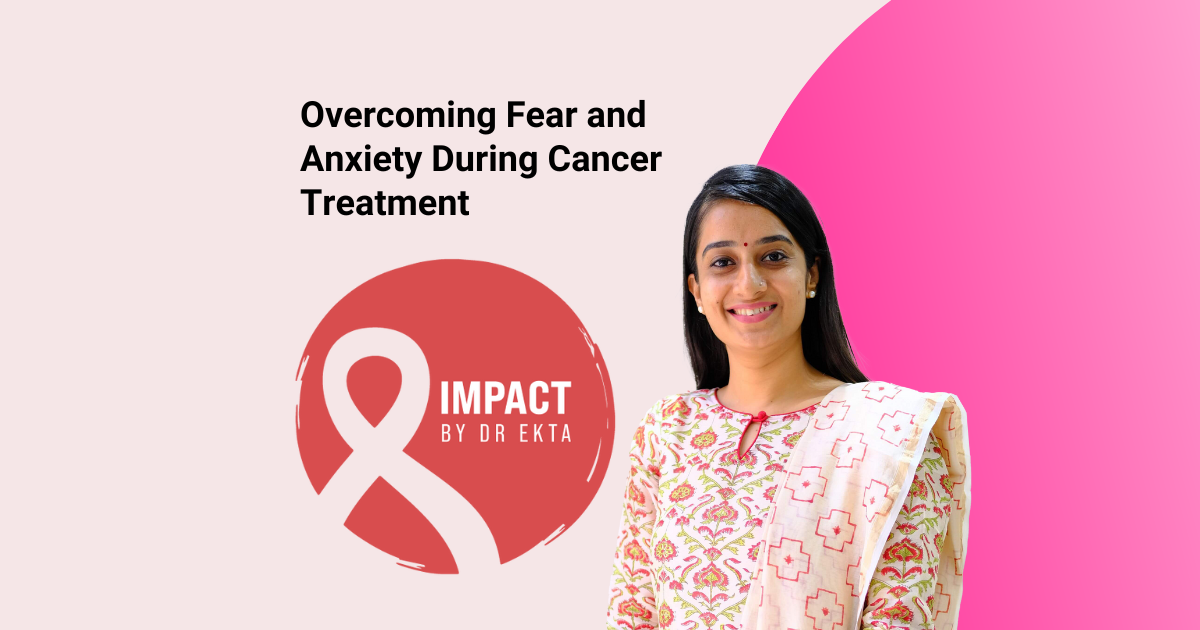I’ve walked alongside countless patients as they navigate the often-challenging journey of cancer treatment. One thing I’ve observed time and again is that the physical aspects of treatment are only part of the battle. Fear and anxiety frequently accompany a cancer diagnosis, and addressing these emotional responses is just as vital as treating the disease itself.
When a patient first hears the words “You have cancer,” their world can feel as if it’s been turned upside down. It’s natural to feel fear-fear of the unknown, fear of the treatment process, and, of course, fear of the outcome. In this blog, I’d like to share insights on how to confront these emotions and build resilience during cancer treatment.
The Emotional Toll of Cancer
Cancer treatment can evoke a whirlwind of emotions. Fear and anxiety are among the most common responses, often fueled by uncertainty and a lack of control. Patients worry about how their lives will change, how their loved ones will cope, and whether they’ll be able to manage the side effects of treatment.
This emotional toll isn’t just an abstract concept. Anxiety can manifest physically difficulty sleeping, increased heart rate, loss of appetite, and even compromised immunity. If left unchecked, it can make the treatment process even more challenging. Recognizing and addressing these feelings early is a crucial step in taking control of your cancer journey.
Understanding the Root of Fear
The fear that arises during cancer treatment often stems from a sense of vulnerability and a fear of the unknown. Will the treatment work? How will my body respond? What will my future look like? These questions are entirely natural and valid.
But it’s important to remember that fear thrives in the absence of knowledge. Many times, I’ve seen patients find relief when we take the time to explain their diagnosis, the proposed treatment plan, and the potential outcomes. Knowledge is a powerful antidote to fear.
Strategies to Overcome Fear and Anxiety
While there’s no one-size-fits-all approach to managing anxiety during cancer treatment, there are several strategies I encourage my patients to explore:
1. Seek Information
Understanding your cancer treatment plan can provide a sense of control. Ask your oncologist about every step of the process, from diagnosis to follow-up care. Knowing what to expect can reduce uncertainty and help you feel more prepared.
2. Build a Support System
One of the most important things I tell my patients is that they don’t have to go through this journey alone. Family, friends, and support groups can provide comfort and understanding. Sharing your fears with someone who listens whether it’s a loved one, a therapist, or a fellow patient-can lighten the emotional load.
3. Focus on the Present
Cancer treatment can be overwhelming when you think about the entirety of the journey ahead. Focusing on one day at a time can make the process feel more manageable. Mindfulness exercises, such as meditation and deep breathing, can help anchor you in the present moment.
4. Stay Active
Engaging in light physical activity, such as walking or yoga, can have a significant impact on mental well-being. Exercise releases endorphins, which can improve your mood and reduce anxiety. Always consult your doctor to ensure that your activity level aligns with your treatment plan.
5. Consider Professional Support
There’s no shame in seeking help from a mental health professional. Many of my patients have benefitted from counseling or therapy sessions, where they learn coping mechanisms tailored to their unique challenges. Some also find solace in techniques like cognitive-behavioral therapy (CBT), which focuses on reframing negative thought patterns.
6. Practice Gratitude
Gratitude doesn’t mean ignoring the challenges of cancer treatment, it means recognizing the moments of joy and hope amidst the difficulties. Keeping a gratitude journal or simply reflecting on what you’re thankful for each day can help shift your perspective.
The Role of Communication
One of the most effective tools in overcoming anxiety during cancer treatment is open communication. Don’t hesitate to share your fears with your oncologist. I encourage my patients to ask questions, voice concerns, and even share their emotional struggles.
As doctors, we’re here to provide not just medical care but also emotional support. If there’s a side effect you’re worried about, a treatment option you’re uncertain of, or an emotional burden you’re carrying, let us know. Together, we can find solutions that address your physical and mental health.
The Power of Hope
It’s natural to feel overwhelmed during cancer treatment, but I always remind my patients that hope is a powerful ally. Advances in cancer care are happening every day, and treatments are becoming more effective and less invasive. Many patients go on to lead fulfilling, healthy lives after completing treatment.
Hope doesn’t mean denying the reality of your situation it means believing in the possibility of better days ahead.
Final Thoughts
Cancer treatment is a journey that tests not just the body but also the mind. Fear and anxiety are natural companions on this path, but they don’t have to define your experience. By seeking knowledge, building a support system, and practicing self-care, you can confront these emotions and emerge stronger.
If you or a loved one is experiencing fear or anxiety during cancer treatment, don’t hesitate to reach out for help. Whether it’s speaking with your medical team, joining a support group, or exploring mental health resources, there’s always support available. You are stronger than you realize, and with the right tools and guidance, you can overcome even the toughest challenges.

